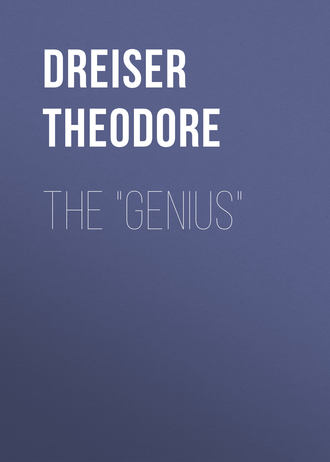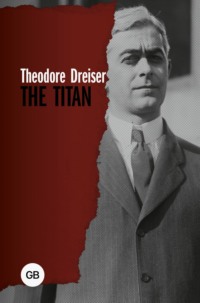 полная версия
полная версияThe "Genius"
It was not long after Eugene was seated in his advertising managerial chair that he saw how things lay. His men, when he gathered them in conference, complained that they were fighting against falling circulations.
"You can talk all you want, Mr. Witla," said one of his men gloomily, "but circulation and circulation only is the answer. They have to keep up the magazines here. All these manufacturers know when they get results. We go out and get new business all the time, but we don't keep it. We can't keep it. The magazines don't bring results. What are you going to do about that?"
"I'll tell you what we are going to do," replied Eugene calmly, "we're going to key up the magazines. I understand that a number of changes are coming in that direction. They are doing better already. The manufacturing department, for one thing, is in splendid shape. I know that. In a short time the editorial departments will be. I want you people to put up, at this time, the best fight you know how under the conditions as they are. I'm not going to make any changes here if I can help it. I'm going to show you how it can be done – each one separately. I want you to believe that we have the greatest organization in the world, and it can be made to sweep everything before it. Take a look at Mr. Colfax. Do you think he is ever going to fail? We may, but he won't."
The men liked Eugene's manner and confidence. They liked his faith in them, and it was not more than ten days before he had won their confidence completely. He took home to the hotel where he and Angela were stopping temporarily all the magazines, and examined them carefully. He took home a number of the latest books issued, and asked Angela to read them. He tried to think just what it was each magazine should represent, and who and where was the man who would give to each its proper life and vigor. At once, for the adventure magazine, he thought of a man whom he had met years before who had since been making a good deal of a success editing a Sunday newspaper magazine supplement, Jack Bezenah. He had started out to be a radical writer, but had tamed down and become a most efficient newspaper man. Eugene had met him several times in the last few years and each time had been impressed by the force and subtlety of his judgment of life. Once he had said to him, "Jack, you ought to be editing a magazine of your own."
"I will be, I will be," returned that worthy. Now as he looked at this particular proposition Bezenah stuck in his mind as the man who should be employed. He had seen the present editor, but he seemed to have no force at all.
The weekly needed a man like Townsend Miller – where would he find him? The present man's ideas were interesting but not sufficiently general in their appeal. Eugene went about among the various editors looking at them, ostensibly making their acquaintance, but he was not satisfied with any one of them.
He waited to see that his own department was not needing any vast effort on his part before he said to Colfax one day:
"Things are not right with your editorial department. I've looked into my particular job to see that there is nothing so radically behindhand there but what it can be remedied, but your magazines are not right. I wish, aside from salary proposition entirely, that you would let me begin to make a few changes. You haven't the right sort of people upstairs. I'll try not to move too fast, but you couldn't be worse off than you are now in some instances."
"I know it!" said Colfax. "I know it! What do you suggest?"
"Simply better men, that's all," replied Eugene. "Better men with newer ideas. It may cost you a little more money at present, but it will bring you more back in the long run."
"You're right! You're right!" insisted Colfax enthusiastically. "I've been waiting for someone whose judgment I thought was worth two whoops to come and tell me that for a long time. So far as I'm concerned you can take charge right now! The salary that I promised you goes with it. I want to tell you something, though! I want to tell you something! You're going in there now with full authority, but don't you fall or stub your toe or get sick or make any mistakes. If you do, God help you! if you do, I'll eat you alive! I'm a good employer, Witla. I'll pay any price for good men, within reason, but if I think I'm being done, or made a fool of, or a man is making a mistake, then there's no mercy in me – not a single bit. I'm a plain, everyday blank, blank, blank" (and he used a term so foul that it would not bear repetition in print), "and that's all there is to me. Now we understand each other."
Eugene looked at the man in astonishment. There was a hard, cold gleam in his blue eyes which he had seen there before. His presence was electric – his look demoniac.
"I've had a remark somewhat of that nature made to me before," commented Eugene. He was thinking of Summerfield's "the coal shute for yours." He had hardly expected to hear so cold and definite a proposition laid down so soon after his entry upon his new duties, but here it was, and he had to face it. He was sorry for the moment that he had ever left Kalvin.
"I'm not at all afraid of responsibility," replied Eugene grimly. "I'm not going to fall down or stub my toe or make any mistakes if I can help it. And if I do I won't complain to you."
"Well, I'm only telling you," said Colfax, smiling and good-natured again. The cold light was gone. "And I mean it in the best way in the world. I'll back you up with all power and authority, but if you fail, God help you; I can't."
He went back to his desk and Eugene went upstairs. He felt as though the red cap of a cardinal had been put upon his head, and at the same time an axe suspended over him. He would have to think carefully of what he was doing from now on. He would have to go slow, but he would have to go. All power had been given him – all authority. He could go upstairs now and discharge everybody in the place. Colfax would back him up, but he would have to replace them. And that quickly and effectively. It was a trying hour, notable but grim.
His first move was to send for Bezenah. He had not seen him for some time, but his stationery which he now had headed "The United Magazines Corporation," and in one corner "Office of the Managing Publisher," brought him fast enough. It was a daring thing to do in a way thus to style himself managing publisher, when so many able men were concerned in the work, but this fact did not disturb him. He was bound and determined to begin, and this stationery – the mere engraving of it – was as good a way as any of serving notice that he was in the saddle. The news flew like wild fire about the building, for there were many in his office, even his private stenographer, to carry the news. All the editors and assistants wondered what it could mean, but they asked no questions, except among themselves. No general announcement had been made. On the same stationery he sent for Adolph Morgenbau, who had exhibited marked skill at Summerfield's as his assistant, and who had since become art editor of The Sphere, a magazine of rising importance. He thought that Morgenbau might now be fitted to handle the art work under him, and he was not mistaken. Morgenbau had developed into a man of considerable force and intelligence, and was only too glad to be connected with Eugene again. He also talked with various advertising men, artists and writers as to just who were the most live editorial men in the field at that time, and these he wrote to, asking if they would come to see him. One by one they came, for the fact that he had come to New York to take charge not only of the advertising but the editorial ends of the United Magazines Corporation spread rapidly over the city. All those interested in art, writing, editing and advertising heard of it. Those who had known something of him in the past could scarcely believe their ears. Where did he get the skill?
Eugene stated to Colfax that he deemed it advisable that a general announcement be made to the staff that he was in charge. "I have been looking about," he said, "and I think I know what I want to do."
The various editors, art directors, advertising men and book workers were called to the main office and Colfax announced that he wished to make a statement which affected all those present. "Mr. Witla here will be in charge of all the publishing ends of this business from now on. I am withdrawing from any say in the matter, for I am satisfied that I do not know as much about it as he does. I want you all to look to him for advice and counsel just as you have to me in the past. Mr. White will continue in charge of the manufacturing and distributing end of the business. Mr. White and Mr. Witla will work together. That's all I have to say."
The company departed, and once more Eugene returned to his office. He decided at once to find an advertising man who could work under him and run that branch of the business as well as he would. He spent some time looking for this man, and finally found him working for the Hays-Rickert Company, a man whom he had known something of in the past as an exceptional worker. He was a strong, forceful individual of thirty-two, Carter Hayes by name, who was very anxious to succeed in his chosen work, and who saw a great opportunity here. He did not like Eugene so very well – he thought that he was over-estimated – but he decided to work for him. The latter put him in at ten thousand a year and then turned his attention to his new duties completely.
The editorial and publishing world was entirely new to Eugene from the executive side. He did not understand it as well as he did the art and advertising worlds, and because it was in a way comparatively new and strange to him he made a number of initial mistakes. His first was in concluding that all the men about him were more or less weak and inefficient, principally because the magazines were weak, when, as a matter of fact, there were a number of excellent men whom conditions had repressed, and who were only waiting for some slight recognition to be of great value. In the next place, he was not clear as to the exact policies to be followed in the case of each publication, and he was not inclined to listen humbly to those who could tell him. His best plan would have been to have gone exceedingly slow, watching the men who were in charge, getting their theories and supplementing their efforts with genial suggestions. Instead he decided on sweeping changes and not long after he had been in charge he began to make them. Marchwood, the editor of the Review, was removed, as was Gailer of the Weekly. The editorship of the Adventure Story Magazine was given to Bezenah.
In any organization of this kind, however, great improvements cannot be effected in a moment, and weeks and months must elapse before any noticeable change can be shown. Instead of throwing the burden of responsibility on each of his assistants and leaving it there, making occasional criticisms, Eugene undertook to work with each and all of them, endeavoring to direct the policy intimately in each particular case. It was not easy, and to him at times it was confusing. He had a great deal to learn. Still he did have helpful ideas in a score of directions daily and these told. The magazines were improved. The first issues which were affected by his judgment and those of his men were inspected closely by Colfax and White. The latter was particularly anxious to see what improvement had been made, and while he could not judge well himself, he had the means of getting opinions. Nearly all these were favorable, much to his disappointment, for he hoped to find things to criticize.
Colfax, who had been watching Eugene's determined air, the energy with which he went about his work and the manner in which he freely accepted responsibility, came to admire him even more than he had before. He liked him socially – his companionship after business hours – and began to invite him up to the house to dinner. Unlike Kalvin, on most of these occasions he did not take Angela into consideration, for having met her he was not so very much impressed with her. She was nice, but not of the same coruscating quality as her husband. Mrs. Colfax expressed a derogatory opinion, and this also made it difficult. He sincerely wished that Eugene were single.
Time passed. As Eugene worked more and more with the various propositions which this situation involved, he became more and more at his ease. Those who have ever held an executive position of any importance know how easy it is, given a certain degree of talent, to attract men and women of ability and force according to that talent. Like seeks like and those who are looking for advancement in their world according to their talents naturally drift to those who are more highly placed and who are much like themselves. Advertising men, artists, circulation men, editors, book critics, authors and all those who were sufficiently in his vein to understand or appreciate him sought him out, and by degrees he was compelled to learn to refer all applicants to the heads of departments. He was compelled to learn to rely to a certain degree on his men, and having learned this he was inclined to go to the other extreme and rely too much. In the case of Carter Hayes, in the advertising department, he was particularly impressed with the man's efficiency, and rested on him heavily for all the details of that work, merely inspecting his programs of procedure and advising him in difficult situations. The latter appreciated this, for he was egotistic to the roots, but it did not develop a sense of loyalty in him. He saw in Eugene a man who had risen by some fluke of fortune, and who was really not an advertising man at heart. He hoped some day that circumstances would bring it about that he could be advertising manager in fact, dealing directly with Colfax and White, whom, because of their greater financial interest in the business, he considered Eugene's superiors, and whom he proposed to court. There were others in the other departments who felt the same way.
The one great difficulty with Eugene was that he had no great power of commanding the loyalty of his assistants. He had the power of inspiring them – of giving them ideas which would be helpful to themselves – but these they used, as a rule, merely to further their own interests, to cause them to advance to a point where they deemed themselves beyond him. Because in his manner he was not hard, distant, bitter, he was considered, as a rule, rather easy. The men whom he employed, and he had talent for picking men of very exceptional ability, sometimes much greater than his own in their particular specialties, looked upon him not so much as a superior after a time, as someone who was in their path and to whose shoes they might properly aspire. He seemed so good natured about the whole work – so easy going. Now and then he took the trouble to tell a man that he was getting too officious, but in the main he did not care much. Things were going smoothly, the magazines were improving, the advertising and circulation departments were showing marked gains, and altogether his life seemed to have blossomed out into comparative perfection. There were storms and daily difficulties, but they were not serious. Colfax advised with him genially when he was in doubt, and White pretended a friendship which he did not feel.
CHAPTER XLIII
The trouble with this situation was that it involved more power, comfort, ease and luxury than Eugene had ever experienced before, and made him a sort of oriental potentate not only among his large company of assistants but in his own home. Angela, who had been watching his career all these years with curiosity, began to conceive of him at last as a genius in every respect – destined to some great pre-eminence, in art or finance or the publishing world or all three. She did not relax her attitude in regard to his conduct, being more convinced than ever that to achieve the dizzy eminence to which he was now so rapidly ascending, he must be more circumspect than ever. People were watching him so closely now. They were so obsequious to him, but still so dangerous. A man in his position must be so careful how he dressed, talked, walked.
"Don't make so much fuss," he used to say to her. "For heaven's sake, let me alone!" This merely produced more quarrels, for Angela was determined to regulate him in spite of his wishes and in his best interests.
Grave men and women in various walks of life – art, literature, philanthropy, trade, began to seek him out, because in the first place he had an understanding mind and because in the next place, which was much more important, he had something to give. There are always those in all walks of life who are seeking something through those avenues which a successful person represents, whatever they may be, and these together with those others who are always intensely eager to bask in the reflected glory of a rising luminary, make a retinue for every successful man. Eugene had his retinue, men and women of his own station or beneath it, who would eagerly shake his hand with an "Oh, yes, indeed. Managing Publisher of the United Magazines Corporation! Oh, yes, yes!" Women particularly were prone to smile, showing him even white teeth and regretting that all good looking and successful men were married.
In July following his coming from Philadelphia the United Magazines Corporation moved into its new building, and then he was installed into the most imposing office of his career. A subtle assistant, wishing to ingratiate the staff in Eugene's good graces, suggested that a collection be taken up for flowers. His room, which was done in white, blue and gold with rose wood furniture, to set it apart from the prevailing decorative scheme and so make it more impressive, was scattered with great bouquets of roses, sweet peas and pinks, in beautiful and ornate vases of different colors, countries and schools. His great rosewood flat-topped desk, covered with a thick, plate glass through which the polished wood shone brightly, was decorated with flowers. On the morning of his entry he held an impromptu reception, on which occasion he was visited by Colfax and White, who after going to look at their new rooms, came to his. A general reception which followed some three weeks later, and in which the successful representatives of various walks of life in the metropolis took part, drew to the building a great crowd, artists, writers, editors, publishers, authors and advertising men who saw him in all his glory. On this occasion, Eugene, with White and Colfax did the receiving. He was admired at a distance by striplings who wondered how he had ever accomplished such great results. His rise had been so meteoric. It seemed so impossible that a man who had started as an artist should change and become a dominant factor in literature and art from a publishing point of view.
In his own home his surroundings were equally showy; he was as much a figure as he was in his office. When he was alone with Angela, which was not so often, for naturally they did a great deal of entertaining, he was a figure even to her. Long ago she had come to think of him as someone who would some day dominate in the art world; but to see him an imposing factor in the city's commercial life, its principal publishers' representative, having a valet and an automobile, riding freely in cabs, lunching at the most exclusive restaurants and clubs, and associating constantly with someone who was of importance, was a different matter.
She was no longer so sure of herself with him, not so certain of her power to control him. They quarreled over little things, but she was not so ready to begin these quarrels. He seemed changed now and deeper still. She was afraid, even yet, that he might make a mistake and lose it all, that the forces of ill will, envy and jealousy which were everywhere apparent in life, and which blow about so easily like gusts of wind, would work him harm. Eugene was apparently at ease, though he was troubled at times for his own safety, when he thought of it, for he had no stock in the company, and was as beholden to Colfax as any hall boy, but he did not see how he could easily be dispensed with. He was making good.
Colfax was friendly to him. He was surprised at times to see how badly the manufacturing arrangements could go awry, affecting his dates of issue, but White invariably had a good excuse. Colfax took him to his house in the country, his lodge in the mountains, on short yachting and fishing trips, for he liked to talk to him, but he rarely if ever invited Angela. He did not seem to think it was necessary to do this, and Eugene was afraid to impress the slight upon his attention, much as he dreaded the thoughts which Angela must be thinking. It was Eugene here and Eugene there, with constant calls of "where are you, old man?" from Colfax, who appeared not to want to be away from him.
"Well, old man," he would say, looking him over much as one might a blood horse or a pedigree dog, "you're getting on. This new job agrees with you. You didn't look like that when you came to me," and he would feel the latest suit Eugene might be wearing, or comment on some pin or tie he had on, or tell him that his shoes were not as good as he could really get, if he wanted to be perfect in dress. Colfax was for grooming his new prize much as one might groom a blood horse, and he was always telling Eugene little details of social life, the right things to do, the right places to be seen, the right places to go, as though Eugene knew little or nothing.
"Now when we go down to Mrs. Savage's Friday afternoon, you get a Truxton Portmanteau. Have you seen them? Well, there's the thing. Got a London coat? Well, you ought to have one. Those servants down there go through your things and they size you up accordingly. Nothing less than two dollars each goes, and five dollars to the butler, remember that."
He assumed and insisted after a fashion which Eugene resented quite as much as he did his persistent ignoring of Angela, but he did not dare comment on it. He could see that Colfax was variable, that he could hate as well as love, and that he rarely took any intermediate ground. Eugene was his favorite now.
"I'll send my car around for you at two Friday," he would say, as though Eugene did not keep a car, when he was planning one of his week-end excursions. "You be ready."
At two, on that day, Colfax's big blue touring car would come speeding up to the entrance of the apartment house and Eugene's valet would carry down his bags, golf sticks, tennis racket and the various paraphernalia that go with a week-end's entertainment, and off the car would roll. At times Angela would be left behind, at times taken, when Eugene could arrange it; but he found that he had to be tactful and accede to Colfax's indifference mostly. Eugene would always explain to her how it was. He was sorry for her in a way, and yet he felt there was some justice in the distinction. She was not exactly suited to that topmost world in which he was now beginning to move. These people were colder, sharper, shrewder, than Angela. They had more of that intense sophistication of manner and experience than she could achieve. As a matter of fact, Angela had as much grace and more than many of the four hundred, but she did lack that quickness of wit or that shallow self-sufficiency and assurance which are the almost invariable traits of those who shine as members of the smart set. Eugene was able to assume this manner whether he felt it or not.
"Oh, that's all right," she would say, "as long as you're doing it for business reasons."
She resented it nevertheless, bitterly, for it seemed such an uncalled for slur. Colfax had no compunctions in adjusting his companionship to suit his moods. He thought Eugene was well suited to this high life. He thought Angela was not. He made the distinction roughly and went his way.
It was in this manner that Eugene learned a curious fact about the social world, and that was that frequently in these highest circles a man would be received where his wife would not and vice versa, and that nothing very much was thought of it, if it could be managed.
"Oh, is that Birkwood," he heard a young swell once remark, concerning an individual in Philadelphia. "Why do they let him in? His wife is charming, but he won't do," and once in New York he heard a daughter ask her mother, of a certain wife who was announced – her husband being at the same table – "who invited her?"









